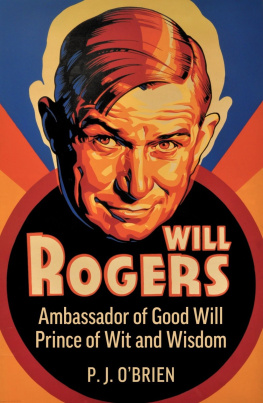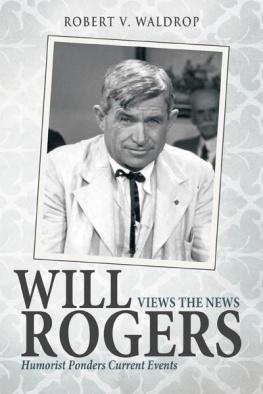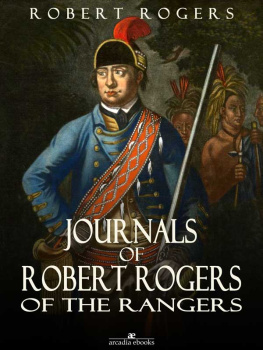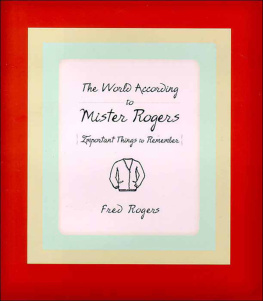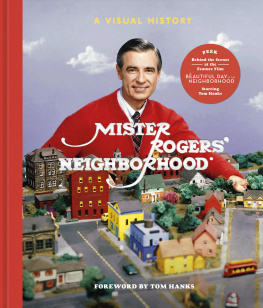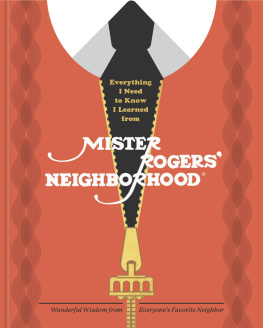

Red Kestrel Books 2019, all rights reserved. No part of this publication may be reproduced, stored in a retrieval system or transmitted by any means, electrical, mechanical or otherwise without the written permission of the copyright holder.
Publishers Note
Although in most cases we have retained the Authors original spelling and grammar to authentically reproduce the work of the Author and the original intent of such material, some additional notes and clarifications have been added for the modern readers benefit.
We have also made every effort to include all maps and illustrations of the original edition the limitations of formatting do not allow of including larger maps, we will upload as many of these maps as possible.
WILL ROGERS
Ambassador of Good Will, Prince of Wit and Wisdom
By
P. J. OBRIEN
Navy Aviation Service, World War
With an Appreciation by LOWELL THOMAS
Will Rogers was originally published in 1935 by the John C. Winston Company, Chicago, Philadelphia, Toronto.
TABLE OF CONTENTS
Contents
An Appreciation
THE CHARACTER and temperament of an age as well as its common sense are reflected in its laughter. So says Dr. J. C. Gregory in his treatise on the Sense of Humor. He remarks further: The way men laugh and the things they laugh at reflect their tastes, thoughts, and sympathies...Society offers its pulse in the nature of its laughter.
The career of Will Rogers is the finest illustration you could find of these observations. If we hadnt had him during the last ten years, if we hadnt appreciated him and had the sense to laugh with him and at ourselves, we should have been a sad people.
He first burgeoned out as the Smiling Prophet of America in the era of the Great Insanity, the period we remember because of the tragic comedy of Teapot Dome, which culminated in the cataclysm of November, 1929. Political magnificos worried and denounced; editors exploded in 12-point type. Rogers poured out a steady stream of sparkling common sense that helped us to maintain some sort of perspective.
When the Depression descended upon us in such volume that not even the most ostrich-minded could deny it, the man from Oklahoma stuck out among us as a flashing tower of sanity. And people listened to him. Historians and economists tried to remind us that there had been previous depressions and that the Republic had survived. But we needed the droll, jovial gags of Will Rogers to make us keep our feet on the ground.
One of the finest facts about him was that he never took a crack at any maneither a man, a party, or a classunless he or it was riding cockily on top of the world. For example: his most ludicrous comment upon bankers was delivered at a time when they were the Sacred White Cows of every editorial office in America. It was in 1924 that Rogers came out with the paragraph: Vanderlip made a speech at the Rotary Club of Ossining, New York, that astonished the United States...Rotary is composed of one of the best of each line of work or business...Mr. Vanderlip must have felt right at home up there. There are more bankers at Ossining than any town of its size in the United States.
If that had been said in 1933, it would have been an obvious, almost cowardly jab. But at the time that Rogers published it, bankers were still the High Priests of Finance, quoted with reverence upon any subject from world politics to birth control.
After the pendulum had swung, after they had become a general target for abuse, Rogers declined to join the chorus. Instead, he turned the fire of his comedic machine guns upon the people who were kicking the bankers. As he said himself with his unforgettable grin: Im always agin the party thats up. At the height of the Teapot Dome Scandal, he kidded Senator Walsh, the prosecutor, as merrily as he did Sinclair and Doheny. Later on, when the bankers were in the pillory, Rogers aimed his most pointed barbs at their inquisitors, Senator Black and Counselor Ferdie Pecora. On all such occasions, the essence of his quality was that he made everybody like it. Some of us winced a bit, but after we had caught our breath, we all had to join in the laughter.
Since his death the pundits have been saying that Rogers had not as deep a background of philosophy as Mark Twain. How Will would have chuckled at the suggestion. But if you consider his jesting as a whole, you will see that the gum-chewing master of the lariat had one of the soundest and oldest of all philosophies in the worlda fine scorn for all shams and pretensions. It was always the bumptious, the poseurs, at whom he poked the most fun. He had an amazing faculty for penetrating poses, equaled only by his ability to do it without venom.
One of the principal differences between him and Mark Twain was that Rogers lacked capacity for the fierce indignation to which Clemens gave vent in his later years.
In describing Innocents Abroad, Stephen Leacock has aptly observed that Mark Twain could see Europe more clearly from the top of the Rockies than could the people walking in the Rue de Rivoli or sitting around the Forum in Rome. Rogers had a good measure of the same faculty. He could see not only Europe but his own country. But it never made him indignant.
The only pose in Will Rogers was the pretense that he was an ignorant and illiterate fellow. Actually he was nothing of the sort. As he once remarked, We are all of us ignorant, but not about the same things. Though he made a bluff at concealing it, his writings from time to time betrayed an exceedingly wide knowledge. Whether he was conscious of it or not, the system behind his humor was an exceedingly old one. It can be described in one wordTruth. It is one of the most ancient formulae of the Comic Spirit. As Max Eastman has remarked: Truth is a chief source of the joy motive in popular jokes...We are always hungry for the simple truth.
That, in the last analysis, is what Will Rogers gave us.
LOWELL THOMAS
Acknowledgments
The authors and publishers sincere thanks are extended to V. V. McNitt, head of the McNaught Syndicate, who discovered the great ability of Will Rogers as a writer, for his permission to use portions of Rogers writings in this book. The author is deeply indebted to Friar Joe Laurie, Jr., for the use of hitherto little known material on Rogers from Lauries own files; to Friar Vic Guinness for his unselfish interest and help; and to Mark Wilson of the Shubert organization for his worthwhile assistance.
I. Tragedy of the Tundra
A Red Bus CrashesHis Daughters PictureKing Charlie of the ArcticRogers in Rare HumorArctic Flight HazardousOff for Somewhere.
IN THE weird, half-light of a summer night in the far Northland, a red, low-winged monoplane skimmed gracefully along the surface of a shallow river that pierced the bleak Alaskan tundra. The ship gained speed, climbed a scanty fifty feet, and then plunged awkwardly, out of control, to the water below. It was as if some invisible hunter with a powerful, silent weapon had sent a lethal charge into the gaily-colored, man-made bird. No one moved in the broken airplane. Its occupants had made their final landing.
Thus did Will Rogers, beloved prince of wit and wisdom, and Wiley Post, master aviator, meet their end in the barren wilderness a few miles from the last outpost of civilization in North America.
Only a terrified Eskimo seal hunter saw the ship as it crashed into the edge of the little unnamed stream, and in his fright he ran away from the tangled wreckage of the once-roaring machine of his white-faced brothers. As the echo of the crash rolled away over the hummocky tundra, the native, Clair Oakpeha, made his way back to the river bank and shouted loudly to the men in the plane. There was no answer. Only the Arctic stillness.
Next page
